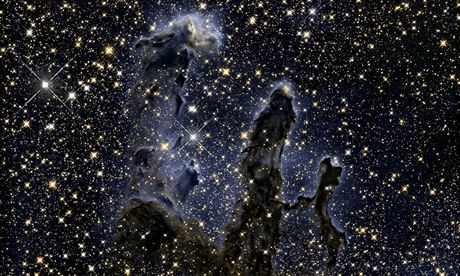
Ever since mankind began to count, the uncountable stars have been filling us with awe. But the splendour revealed by a cloudless night reveals only a fraction of the universe’s truly awe-inspiring scale. The Hubble space telescope reveals a tiny smudge in the sky such as Andromeda to be a galaxy vaster than our own, teeming with a trillion stars, one of a hundred million other galaxies spread across the heavens.
Science today shows us a very different universe than the clockwork model imagined by Isaac Newton in his description of gravity. Jules Verne could imagine shooting a rocket from the Earth to the moon in 1865, but could not have imagined the vastness even of our solar system’s Kuiper belt. It was only when Edwin Hubble identified the first star beyond the Milky Way, and only when the telescope that bore his name photographed 3,000 galaxies in a single patch of “empty” space, that the human eye could glimpse the near infinite depths of space.
The work of the most ambitious SF authors like Iain M Banks, Vernor Vinge and David Brin manages to capture the true scale of the universe in fiction. And even then SF can detail only the tiniest portion of a cosmos some 93bn light years wide (and expanding ever more quickly), shaped by the unifying force of gravity, where the elements of life are created in supernova explosions and destroyed in black holes. The scientific model of the universe begins to look eerily like that expressed by Hindu astronomers over 3,000 years ago, in which the cycles of the universe are measured in aeons 1.28tn years long, reality is maintained by the force of Vishnu, and all things are created by Brahma and destroyed by Shiva.
Perhaps it’s these mythic resonances that have seen science fiction trend more and more towards religious zeal in recent years. The Singularity, a point in the near future when technology evolves so fast that it allows life to transcend all physical boundaries, is now a common idea in SF, explored by writers from Damien Broderick to Charlie Stross. Its believers style themselves as singulatarians and transhumanists, but their rhetoric of life after death in silicon virtual realities so deeply echoes fundamentalist Christianity that no one is joking when they call it the Rapture of the Nerds.
There is no evidence to suggest that humans will ever be able to download their consciousness into the computer mind of a robot, any more than we can psychically inhabit an abacus, sundial, toaster or any other mechanical device. One day we’ll look back on this sci-fi myth with the same scepticism we now reserve for the idea of souls reincarnating across time. Both are ways of asking very basic questions of human existence – what happens after we die? Is our sense of self created by an immortal soul or a cognitive illusion? Is there a chance, however slight, that we can find again the people we love after death? We call it speculative fiction precisely because SF provides a place to speculate on the answers to such questions.
We gather in our millions in the darkened cathedrals of multiplex cinemas to silently venerate our superhero gods. All religions have their holy stories, and the immense respect given to SF novels like 1984 and I Robot by their fans is very close to an act of faith. We’re only a few centuries and a small apocalyptic event away from isolated communities of huddled believers worshipping the gospels of Heinlein, Asimov, Clarke, and Le Guin. If a future society based on the eccentric thinking of sci-fi writers seems outrageous, it’s no stranger than a society founded on Genesis, Exodus and Revelations.
Let’s not think about L Ron Hubbard.
Is it a bad thing that SF has evolved into a religion for modern times? It’s often argued that science has killed God, and that scientific knowledge reduces the mystery of the universe. But looking at the trillion stars of Andromeda, photographed by an orbiting telescope that is a miracle by any measure, on a computer screen that connects me to billions of other sentient minds, I’m tempted to argue the opposite. Every time science opens up further depths of our universe, the mystery of it all only deepens. And the hunger for stories that speculate on answers to that mystery only grows.

